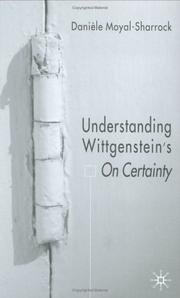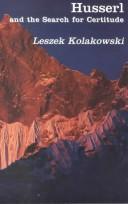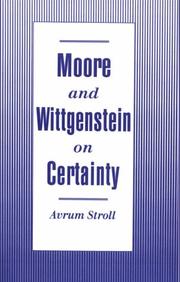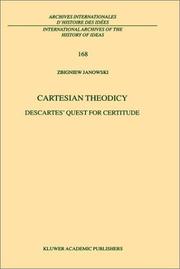| Listing 1 - 6 of 6 |
Sort by
|
Book
ISBN: 9789460580420 Year: 2010 Publisher: Antwerpen Luster
Abstract | Keywords | Export | Availability | Bookmark
 Loading...
Loading...Choose an application
- Reference Manager
- EndNote
- RefWorks (Direct export to RefWorks)
Overtuigd zijn van je gelijk, ook al heb je ongelijk. Aan de hand van de nieuwste bevindingen in de neurowetenschap beschrijft neuroloog Robert Burton de soms paradoxale relatie tussen onze gedachten en wat we uiteindelijk weten.Je herkent het wanneer je iets zeker weet, niet? Je "weet" dat de lucht blauw is, of dat het verkeerslicht net op groen sprong. Dat zijn nu eenmaal dingen die je doodgewoon... weet. In Zeker Weten ? laat neuroloog Robert Burton zien hoe dit gevoel van zekerheid -het gevoel dat we iets weten- eerder een mentale gewaarwording is dan een vaststaand feit. Met andere woorden, het gevoel van weten overkomt ons, we kunnen het niet bewust oproepen. Aan de hand van de nieuwste bevindingen in de neurowetenschap, experimentele data en fascinerende anekdotes, onderzoekt Robert Burton de soms paradoxale relatie tussen onze gedachten en wat we uiteindelijk weten. Zeker Weten ? is provocerend en baanbrekend. Het zet vraagtekens bij alles wat we weten (of denken te weten) over onze geest, kennis en rede. Bron : http://www.uitgeverijluster.be
Developmental psychology --- Certainty --- Certitude --- Zekerheid --- Zekerheid (Filosofie) --- Zekerheidsprobleem --- Neurologie --- Neuropsychologie --- Denken --- Hersenen --- Verpleegkunde

ISBN: 140392175X Year: 2004 Publisher: Basingstoke Palgrave Macmillan
Abstract | Keywords | Export | Availability | Bookmark
 Loading...
Loading...Choose an application
- Reference Manager
- EndNote
- RefWorks (Direct export to RefWorks)
Certainty --- Certitude --- Zekerheid --- Zekerheid (Filosofie) --- Zekerheidsprobleem --- Indubitability --- Knowledge, Theory of --- Logic --- Truth --- Wittgenstein, Ludwig,

ISBN: 0226450368 9780226450360 Year: 1987 Publisher: Chicago, Ill.
Abstract | Keywords | Export | Availability | Bookmark
 Loading...
Loading...Choose an application
- Reference Manager
- EndNote
- RefWorks (Direct export to RefWorks)
Theory of knowledge --- Husserl, Edmund --- Certainty --- Certitude --- Zekerheid --- Zekerheid (Filosofie) --- Zekerheidsprobleem --- 1 HUSSERL, EDMUND --- Indubitability --- 1 HUSSERL, EDMUND Filosofie. Psychologie--HUSSERL, EDMUND --- Filosofie. Psychologie--HUSSERL, EDMUND --- Husserl, Edmond --- Knowledge, Theory of --- Logic --- Truth --- Husserl, Edmund, --- Husserl, Edmund, - 1859-1938

ISBN: 0195084888 9780195084887 Year: 1994 Publisher: New York (N.Y.): Oxford university press
Abstract | Keywords | Export | Availability | Bookmark
 Loading...
Loading...Choose an application
- Reference Manager
- EndNote
- RefWorks (Direct export to RefWorks)
Certainty. --- Skepticism. --- Certainty --- Certitude --- Ongeloof --- Scepticism --- Scepticisme --- Skepticism --- Unbelief --- Zekerheid --- Zekerheid (Filosofie) --- Zekerheidsprobleem --- Theory of knowledge --- Moore, George E. --- Wittgenstein, Ludwig --- Indubitability --- Moore, G. E. --- Moore, G. E. - (George Edward), - 1873-1958. --- Wittgenstein, Ludwig, - 1889-1951. - èUber Gewissheit. --- Agnosticism --- Belief and doubt --- Free thought --- Knowledge, Theory of --- Logic --- Truth --- Wittgenstein, Ludwig, --- Moore, George Edward, --- Mūra, Jī. Ī., --- Moore, G.E.
Book
ISBN: 9782503542515 2503542514 Year: 2013 Publisher: Turnhout Brepols
Abstract | Keywords | Export | Availability | Bookmark
 Loading...
Loading...Choose an application
- Reference Manager
- EndNote
- RefWorks (Direct export to RefWorks)
Some of the contents: Préface: Certitude et pensée moderne, Annarita Angelini - Un savoir-opérer sujet à la règle. Certitude et incertitude dans la théorie de l'architecture de Brunelleschi-Alberti, Annarita Angelini - Les relations d
Certainty --- Belief and doubt --- Rationalism --- Irrationalism (Philosophy) --- Philosophy, Renaissance --- Certitude --- Croyance et doute --- Rationalisme --- Irrationalisme (Philosophie) --- Philosophie de la Renaissance --- Croyance (Philosophie) --- Croyance (Psychologie) --- Doute --- Doute méthodique --- Geloof en twijfel --- Irrationalisme (Filosofie) --- Onzekerheid --- Zekerheid --- Zekerheid (Filosofie) --- Zekerheidsprobleem --- Influence de la Renaissance --- Comparative literature --- Thematology --- anno 1600-1699 --- anno 1500-1599 --- Incertitude --- Thèmes, motifs --- Dans la littérature --- Influence de la Renaissance. --- Thèmes, motifs. --- Dans la littérature.

ISBN: 079236127X 1402002572 9401091447 9780792361275 Year: 2000 Volume: 168 Publisher: Dordrecht Kluwer
Abstract | Keywords | Export | Availability | Bookmark
 Loading...
Loading...Choose an application
- Reference Manager
- EndNote
- RefWorks (Direct export to RefWorks)
Almost all interpreters of Cartesian philosophy have hitherto focused on the epistemological aspect of Descartes' thought. In his Cartesian Theodicy, Janowski demonstrates that Descartes' epistemological problems are merely rearticulations of theological questions. For example, Descartes' attempt to define the role of God in man's cognitive fallibility is a reiteration of an old argument that points out the incongruity between the existence of God and evil, and his pivotal question `whence error?' is shown here to be a rephrasing of the question `whence evil?' The answer Descartes gives in the Meditations is actually a reformulation of the answer found in St. Augustine's De Libero Arbitrio and the Confessions. The influence of St. Augustine on Descartes can also be detected in the doctrine of eternal truths which, within the context of the 17th-century debates over the question of the nature of divine freedom, caused Descartes to ally himself with the Augustinian Oratorians against the Jesuits. Both in his Cartesian Theodicy as well as his Index Augustino-Cartesian, Textes et Commentaire Janowski shows that the entire Cartesian metaphysics can - and should - be read within the context of Augustinian thought.
Certainty --- Certitude --- Zekerheid --- Zekerheid (Filosofie) --- Zekerheidsprobleem --- Théodicée --- Contributions in theodicy. --- -Evil, Problem of (Theology) --- Indubitability --- -Permissive will --- -Contributions in theodicy --- Theodicy --- Knowledge, Theory of --- Logic --- Truth --- Evil, Problem of (Theology) --- God --- Permissive will of God --- Problem of evil (Theology) --- Good and evil --- History of doctrines --- Permissive will --- Will, Permissive --- Descartes, René, --- Descartes, Renatus --- Cartesius, Renatus --- Descartes, René --- Descartes, René, --- Théodicée --- Histoire des doctrines --- Contributions in theodicy --- 17th century --- Modern philosophy. --- Philosophy. --- Metaphysics. --- Epistemology. --- Modern Philosophy. --- History of Philosophy. --- Epistemology --- Theory of knowledge --- Philosophy --- Psychology --- Ontology --- Philosophy of mind --- Mental philosophy --- Humanities --- Modern philosophy --- Theodicy - History of doctrines - 17th century --- Descartes, René, - 1596-1650 --- Descartes, rene (1596-1650) --- Religion et morale
| Listing 1 - 6 of 6 |
Sort by
|

 Search
Search Feedback
Feedback About UniCat
About UniCat  Help
Help News
News